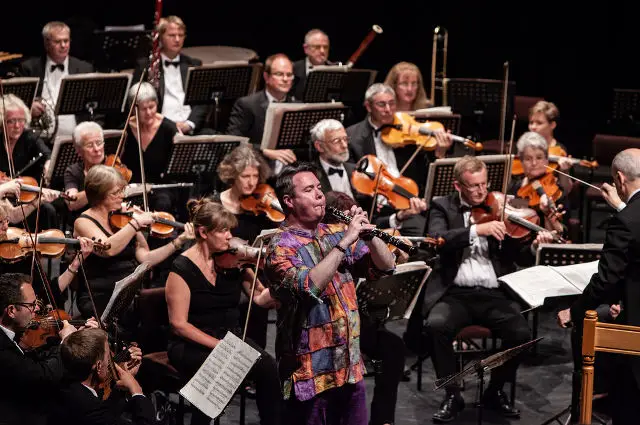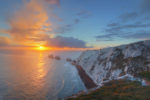Jonathan Dodd shares his review of the latest Isle of Wight Symphony Orchestra (IWSO) concert. Images with kind permission of Allan Marsh. Ed
All that horrible weather and darkness seemed to have faded away as I parked my car at Medina Theatre Saturday evening the weekend before last for the penultimate concert of the Isle of Wight Symphony Orchestra’s current season. The skies had cleared, the evening felt balmy, and I was looking forward to a varied evening’s entertainment.
The day had already been a busy one, with a Wedding and a Cup Final, and the IWSO bravely set out, in their usual imaginative way, to match or even exceed the pleasures of those events. For me, part of the excitement was that there were four pieces of music I had never heard, or indeed heard of, and I looked forward to being introduced to them.
Ruy Blas
The programme started with an overture by Mendelssohn, called Ruy Blas, the title of a Victor Hugo play, an overblown tale of love and betrayal, death and redemption, undertaken in a somewhat grudging way. It was not a promising start to this piece’s life, and it’s a tribute to Mendelssohn’s mastery that it is still played today, unlike the play.
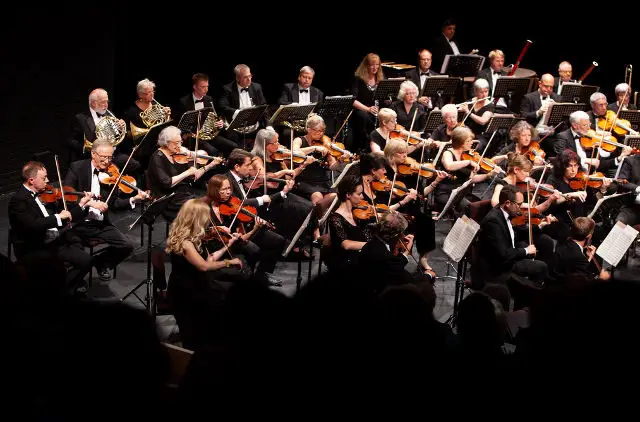
It is full of colour and emotion, depicting the turbulent life of the servant Ruy Blas, duped into wooing a queen, as he ducks and dives, and confronts all manner of dangers and difficulties, and a lot of threat to himself. The IWSO attacked it with vigour and clarity, capturing all the mood swings and thrills and spills in an energetic and vivid way. It was an excellent choice for a programme opener.
Quiet City
I noticed a theme starting up with the second piece, which was also written as incidental music for a play. Aaron Copland has been a favourite of mine for a while, although I hadn’t heard this before. The play, and therefore the music, tell the tale of a man torn between the need to fit in and the desire to rebel. The play wasn’t successful, and Copland later reworked his music into a piece that explores this theme.
It’s most unusual, in that the department store president and the jazz rebel are represented by a cor anglais and a trumpet, both lodged in the orchestra on separate sides. They duet and comment and interweave, with the orchestra filling in around them, in a quite beautiful way.
Max Spiers played the cor anglais with precision and great sensitivity, highlighting the poignancy felt by the successful businessman, as he wishes that he had more in his life.
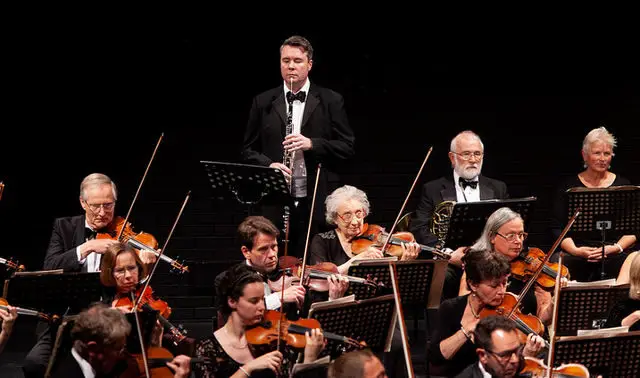
At the same time, Gareth Balch played beautiful jazz-style riffs on the trumpet, illustrating the excitement and freedom for which he yearns. These two players worked beautifully together, producing a range of sounds and emotions that captured the mood and tone perfectly. Night in the city, quiet streets, loneliness, dreams unfulfilled, they were all there.
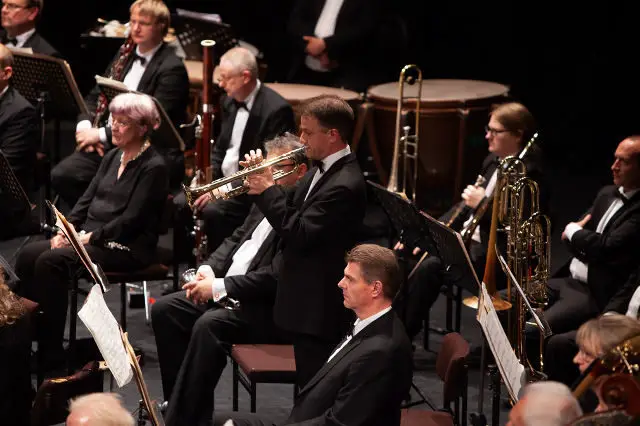
The programme notes mentioned Edward Hopper, and his beautiful paintings, including ‘Nighthawks’, which I love. This performance added to that love, and I’m very grateful to both soloists and the whole orchestra for a beautiful performance.
Summer Evening
The next piece was called ‘Summer Evening’, by Frederic Delius. If ever we wonder about our relationship with Europe, he could be said to epitomise that. He was born in Bradford in 1862, to German parents. He was christened Fritz, but anglicised his name to Frederic, and he was buried in Surrey, although he spent almost the whole of his life abroad, in Norway, Florida and France. But his music is always seen as quintessentially English, describing the landscape and weather and fauna of this country.
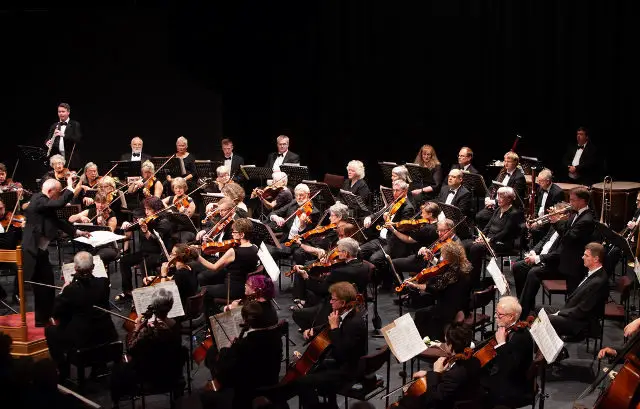
‘Summer Evening’ is the third of three tone poems, and describes exactly that, a summer evening in England. The orchestra played with great subtlety, and I was able to shut my eyes and stroll through the longer grass at the edge of a village green and look over a gently-rolling landscape while listening to the sounds of the birds settling for the night, and I swear I could smell freshly-cut grass somewhere. It was blissful.
L’Horloge de Flore
The last piece before the interval was very exciting. Jean Francaix is another composer I had never heard of before. He supplied my second theme, because he studied under Nadia Boulanger in Paris, as did Copland. ‘L’Horloge de Flore’ can either mean ‘Flower Clock’ or ‘Flora’s Clock’, and is ambitious, because it attempts to convey the spirit and character of various flowers using an oboe. And not just any flowers, because they were chosen for the times of the day (or night) that they open, thus making the floral clock represent a complete day of flower openings.
I know this sounds complicated, but the reality was that Max Spiers entered the auditorium dressed in a rather fetching patchwork shirt that made me think of a sort of Pied Piper of flowers, and he proceeded to enchant us all with the most complex and beautiful rendition of seven different and very varied flowers. I have to admit that I couldn’t keep up with which was which, but I didn’t mind.
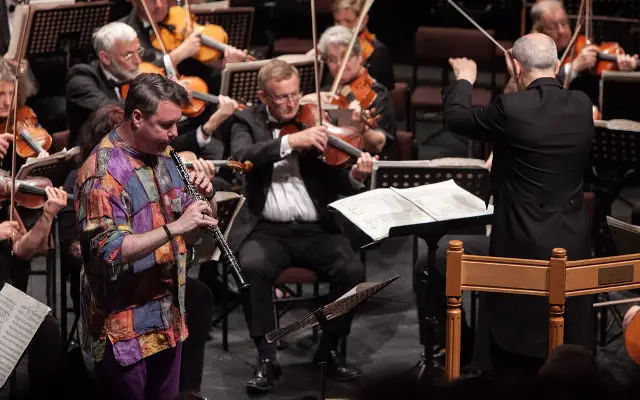
It was entertaining and varied, with a great range of tones and speeds and volume, and many variations in the numbers of players contributing at any time. Mr Spiers is a wonderful oboe player, and he brought the whole thing alive in the most enchanting way, with his presence and his commitment and his virtuosity. I love it, and I’m going to have to listen again, probably several times, to separate out each part. Fantastic.
Sibelius
After the interval, the IWSO got serious and played Sibelius’s 2nd Symphony, a large and possibly epic work, expressing many moods and ideas and even arguments, and which uses and tests the whole orchestra’s concentration and musical prowess. I’ve said before that I’m an admirer mostly of Sibelius’s shorter works, and have yet to be won round entirely to a love for his symphonies, but I’m confident that in time I will do that. The fact that I’m very happy to sit and listen and enjoy the playing of the IWSO is a good start, and they play so well that it feels like a privilege, and I feel like I have a ticket to a significant event, even though I don’t quite understand what it’s all about.
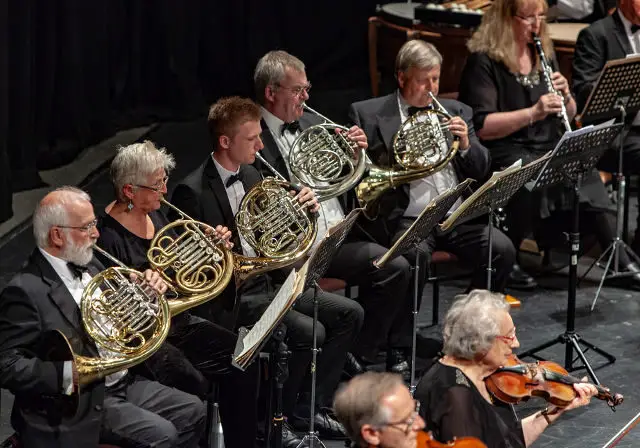
I read the programme notes, written by the amazing and erudite Jane Pelham, as always essential reading and packed with interesting information, and I discovered that Sibelius himself never explained what his symphonies were about. There was talk of being in Italy, and Don Giovanni, and the struggle between good and evil, and patriotism, a theme that carried a lot of weight back in 1902, with Finland trying to become independent of Russia. And there’s the Finnish landscape, ever-present in his work, with those string arrangements. But Sibelius himself compared writing music to making a mosaic, juggling different and possibly unrelated items and eventually coming up with a design that feels complete.
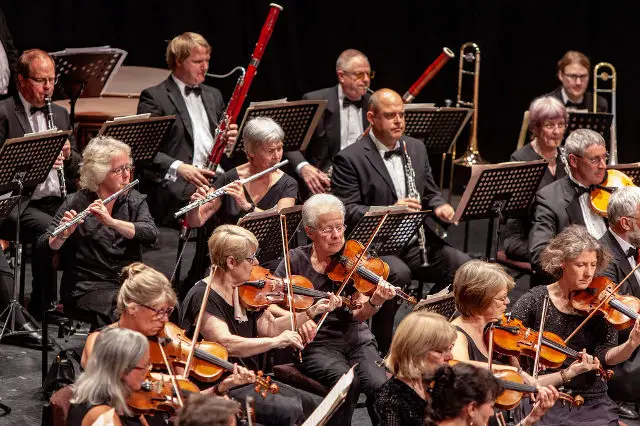
So I no longer worry about not understanding what it’s all about, and I let myself listen and become absorbed by the four movements and the themes and the beautiful interplay between the different instruments, and I can feel the effort and the concentration of all those musicians straining away to produce their best sounds, and I feel that I’ve been privileged to be a small part of it, perhaps one of those tiny tesserae that fills a small gap in the overall experience. And I’m happy.
Thank you, Isle of Wight Symphony Orchestra, for crowning my day with your beautiful playing and your wonderful choice of music to play to me, and I’m already looking forward to the next concert, the last of the current season.
What’s Next?
The last concert this season will be at 7:15pm on Saturday 30th June, at Medina Theatre, and will feature ‘Classics used for the Silver screen’.
It will contain:
- the Overture for the Royal Fireworks by Handel, as used in The Madness of King George,
- the Intermezzo from Cavalleria Rusticana by Mascagni used so thrillingly in the Godfather,
- Rachmaninov’s 2nd Piano Concerto, used unforgettably in Brief Encounter,
- the Things to Come Sweet by Bliss,
- Massenet’s Meditation from Thais, from Titanic, and
- Night on a Bare Mountain by Mussorgsky, obviously to complete a perfect Saturday Night Fever.
It’s going to be brilliant. I’ll see you there. It’s bound to be sold out, so grab your tickets while they’re still available.
Images with kind permission of Allan Marsh. Ed

